Filter by

Electronic Waste Recycling Techniques
This book presents an overview of the characterization of electronic waste. In addition, processing techniques for the recovery of metals, polymers and ceramics are described. This book serves as a source of information and as an educational technical reference for practicing scientists and engineers, as well as for students.
- Edition
- -
- ISBN/ISSN
- 978-3-319-15714-6
- Collation
- 21 b/w illustrations, 3 illustrations in colour
- Series Title
- -
- Call Number
- -
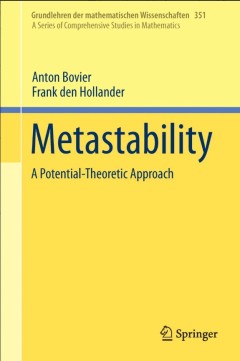
Metastability:A Potential-Theoretic Approach
This monograph provides a concise presentation of a mathematical approach to metastability, a wide-spread phenomenon in the dynamics of non-linear systems - physical, chemical, biological or economic - subject to the action of temporal random forces typically referred to as noise, based on potential theory of reversible Markov processes. The authors shed new light on the metastability pheno…
- Edition
- 1
- ISBN/ISSN
- 0072-7830
- Collation
- XXI, 581
- Series Title
- Grundlehren der mathematischen Wissenschaften
- Call Number
- -
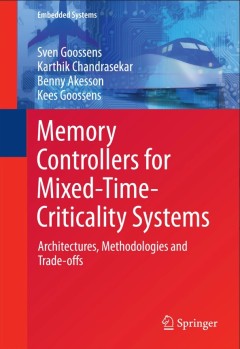
Memory Controllers for Mixed-Time-Criticality Systems:Architectures, Methodol…
This book discusses the design and performance analysis of SDRAM controllers that cater to both real-time and best-effort applications, i.e. mixed-time-criticality memory controllers. The authors describe the state of the art, and then focus on an architecture template for reconfigurable memory controllers that addresses effectively the quickly evolving set of SDRAM standards, in terms of worst…
- Edition
- 1
- ISBN/ISSN
- 978-3-319-32093-9
- Collation
- XXVII, 202
- Series Title
- Embedded Systems
- Call Number
- -
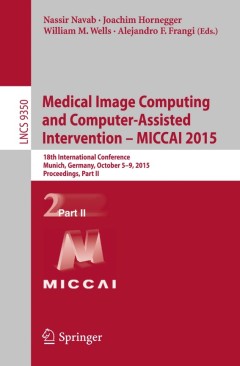
Medical Image Computing and Computer-Assisted Intervention -- MICCAI 2015 18t…
The three-volume set LNCS 9349, 9350, and 9351 constitutes the refereed proceedings of the 18th International Conference on Medical Image Computing and Computer-Assisted Intervention, MICCAI 2015, held in Munich, Germany, in October 2015. Based on rigorous peer reviews, the program committee carefully selected 263 revised papers from 810 submissions for presentation in three volumes. The papers…
- Edition
- 1
- ISBN/ISSN
- 1611-3349
- Collation
- XXVII, 720
- Series Title
- Lecture Notes in Computer Science
- Call Number
- -
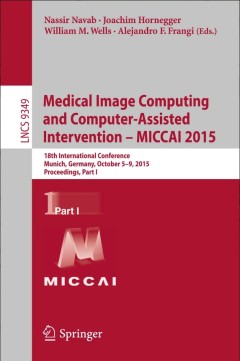
Medical Image Computing and Computer-Assisted Intervention -- MICCAI 2015
The three-volume set LNCS 9349, 9350, and 9351 constitutes the refereed proceedings of the 18th International Conference on Medical Image Computing and Computer-Assisted Intervention, MICCAI 2015, held in Munich, Germany, in October 2015. Based on rigorous peer reviews, the program committee carefully selected 263 revised papers from 810 submissions for presentation in three volumes. The papers…
- Edition
- 1
- ISBN/ISSN
- 978-3-319-24553-9
- Collation
- XLVII, 740
- Series Title
- Lecture Notes in Computer Science
- Call Number
- -
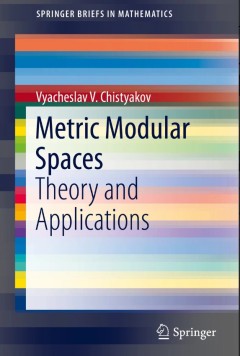
Metric Modular Spaces
Aimed toward researchers and graduate students familiar with elements of functional analysis, linear algebra, and general topology; this book contains a general study of modulars, modular spaces, and metric modular spaces. Modulars may be thought of as generalized velocity fields and serve two important purposes: generate metric spaces in a unified manner and provide a weaker convergence, the m…
- Edition
- 1
- ISBN/ISSN
- 978-3-319-25281-0
- Collation
- XIII, 137
- Series Title
- SpringerBriefs in Mathematics
- Call Number
- -
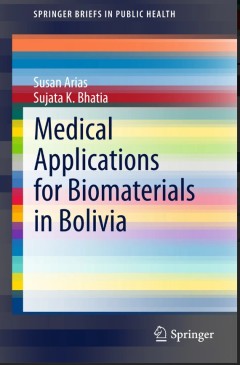
MicroRNAs and Other Non-Coding RNAs in Inflammation
The book serves as a comprehensive resource for scientists and clinicians studying the role of non-coding RNAs in inflammation (viral infections, wound inflammation), human inflammatory diseases (i.e. rheumatoid arthritis, Crohn’s disease, diabetes) and innate immunity. It provides a universal reference work comprising both basic and specialized information. Given that ncRNAs represent new th…
- Edition
- 1
- ISBN/ISSN
- 978-3-319-13688-2
- Collation
- X, 237
- Series Title
- Progress in Inflammation Research
- Call Number
- -
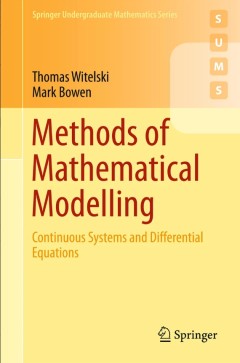
Methods of Mathematical Modelling
This book presents mathematical modelling and the integrated process of formulating sets of equations to describe real-world problems. It describes methods for obtaining solutions of challenging differential equations stemming from problems in areas such as chemical reactions, population dynamics, mechanical systems, and fluid mechanics. Chapters 1 to 4 cover essential topics in ordinary dif…
- Edition
- 1
- ISBN/ISSN
- 978-3-319-23041-2
- Collation
- XVIII, 305
- Series Title
- Springer Undergraduate Mathematics Series
- Call Number
- -
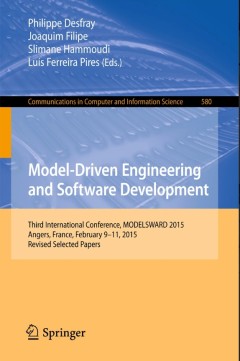
Model-Driven Engineering and Software Development
This book constitutes thoroughly revised and selected papers from the Third International Conference on Model-Driven Engineering and Software Development, MODELSWARD 2015, held in Angers, France, in February 2015.The 25 thoroughly revised and extended papers presented in this volume were carefully reviewed and selected from 94 submissions. They are organized in topical sections named: invited p…
- Edition
- 1
- ISBN/ISSN
- 978-3-319-27868-1
- Collation
- XV, 438
- Series Title
- Communications in Computer and Information Science
- Call Number
- -
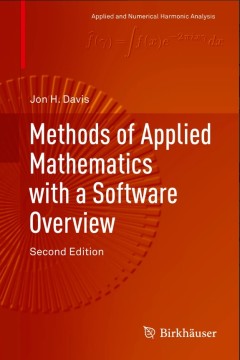
Methods of Applied Mathematics with a Software Overview
This textbook, now in its second edition, provides students with a firm grasp of the fundamental notions and techniques of applied mathematics as well as the software skills to implement them. The text emphasizes the computational aspects of problem solving as well as the limitations and implicit assumptions inherent in the formal methods. Readers are also given a sense of the wide variety of p…
- Edition
- 1
- ISBN/ISSN
- 978-3-319-43369-1
- Collation
- XVII, 781
- Series Title
- Applied and Numerical Harmonic Analysis
- Call Number
- -
 Computer Science, Information & General Works
Computer Science, Information & General Works  Philosophy & Psychology
Philosophy & Psychology  Religion
Religion  Social Sciences
Social Sciences  Language
Language  Pure Science
Pure Science  Applied Sciences
Applied Sciences  Art & Recreation
Art & Recreation  Literature
Literature  History & Geography
History & Geography